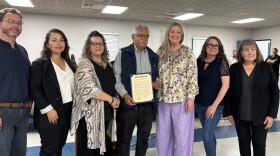The tent city was taken down earlier this week at Gallaudet University in Washington, D.C., after students at the nation's foremost school for the deaf won a lengthy protest. Students were angered by the university's announcement of a new president -- Jane Fernandes. They felt she would be an ineffective leader.
It was a rare show of tenacious -- and successful -- student activism, in an era when college students rarely take to the streets.
The battle at Gallaudet included hunger strikes and arrests. Joseph Shapiro covered it for NPR. He went back to campus yesterday, to sit down with one student leader: Noah Beckman, president of the Student Body Government. They spoke through a sign language interpreter.
Here's a transcript of that conversation:
Joseph Shapiro: Maybe Noah, can I start by having you just introduce yourself?
Noah Beckman: Sure. I am a fourth-year student here. I'm majoring in English with a focus on literature. My family background... my parents are both deaf. I have a deaf younger brother.
JS: When were you elected student body president?
NB: I was inaugurated last May. May 1... two hours before the announcement of the ninth president.
JS: Did anyone imagine that you could have the kind of power that you eventually had?
NB: For some reason, we knew and once we grew our numbers and we agreed on one mission, one statement and action, that it was easier to change the system... and it's interesting to discuss the actions that the president took really sparked the fire.
JS: Which actions?
NB: The arrests I think was the biggest action that sparked the fire.
JS: And that was 133 students arrested on Oct. 13, that night.
NB: Which is known here on campus as Black Friday.
JS: I think people were really struck by the passion of the students here and I think that a lot of people outside of Gallaudet who watch this protest are saying, 'Wow, we don't see student protests like that any more.' Why in this corner of the world, why these students?
NB: I'll try my best to answer that. Maybe because we're a linguistic minority and along with other minorities there's potential to bond. The issue for us here was the administration's attitude. And I think that's what gave us power to congregate and tell the world that the leadership here was ineffective.
JS: Could students on this campus get as excited about the war in Iraq as, say, they were in protesting the choice of a president for their campus?
NB: I'm not so sure if they would, only because you know that's more of a Democrat/Republican thing. I don't know. Maybe we're too focused on our own community here. Here on campus I think there's a lot of oppression that was going on and the oppression was severe. We felt the oppression directly, here on campus.
JS: What was the oppression?
NB: That the students didn't have a voice. They didn't weigh in our voice at all.
JS: But wasn't that the role of the board of trustees though, to select the president?
NB: Right, with understanding and interaction with the community. You know that's one of the many reasons why we chose to come to Gallaudet. Because we wanted to be treated as equals here. To my surprise I'm not equal here. Maybe a little bit more than the outside world but less than expected. And to have that experience at home, you know, our very home, is very very unhealthy.
JS: And after the protest? Do you feel now that students will be treated as equals here?
NB: I will admit that the protest is one step of many that need to take place. This was just one small step of the whole movement.
JS: Noah Beckman, thank you.
NB: Thank you for coming and taking the time to speak with us.
Copyright 2022 NPR. To see more, visit https://www.npr.org. 9(MDAzMjM2NDYzMDEyMzc1Njk5NjAxNzY3OQ001))







